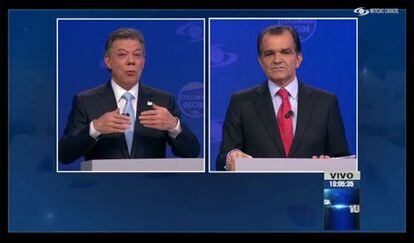Presidential contenders clash over different paths to peace in Colombia
Juan Manuel Santos and Óscar Iván Zuluaga spar in televised debate ahead of June 15 runoff

The peace negotations with FARC guerrillas dominated Thursday’s televised debate between the two contenders in Colombia’s presidential race.
President Juan Manuel Santos and opposition leader Óscar Iván Zuluaga were both asked to pledge that the loser of the June 15 runoff would not sabotage his opponent’s formula to end the 50-year-old conflict.
Although both men provided vague replies, these served to underscore the huge differences in their approach to achieving peace in Colombia.
The incumbent went on the offensive and suggested that his rival did “not understand about the issue of peace” because he has constantly attacked the government’s ongoing negotiations with the FARC in Havana. He also said that, as finance minister, Zuluaga refused to provide financial compensation to the victims of the violence.
If one does not recognize the internal armed conflict, one does not recognize the victims” Juan Manuel Santos, president of Colombia
Zuluaga, a follower of former president Álvaro Uribe and a vocal opponent of the negotiations, which he says will make concessions to the criminals, recently told the political news site La Silla Vacía that there was “not a conflict, but a terrorist threat” in Colombia.
“If one does not recognize the internal armed conflict, one does not recognize the victims either,” said Santos. “You refused to recognize the victims when you were finance minister because they were very expensive, as if the pain of losing a child could be measured in pesos.”
Zuluaga, visibly annoyed, insisted that he wanted a negotiated peace too, but one based on conditions.
“What we need to decide here is what kind of peace we want: a peace without terms like the current government is suggesting, or a peace that comes with conditions,” he said.
After stating in recent weeks that he would suspend all talks with the FARC, the candidate for the Democratic Center now says that he is willing to continue them on condition that the guerrillas stop recruiting new members, setting landmines and attacking the country’s economic infrastructure, among other things.
“Peace has to represent the feeling of all Colombians, and that is why we decided to assess what’s been negotiated and inform the country,” added Zuluaga.
Later came other topics such as unemployment, the justice system, healthcare, international relations and the economy.
Santos took this opportunity to underscore the country’s economic progress and remind the audience of past decisions made by Zuluaga when he was finance minister under the Uribe administration between 2002 and 2010.
I will not stay silent in the face of actions by other countries that affect Colombians” Oscar Iván Zuluaga, opposition leader
“You gave millions’ worth in advantages to the wealthy, and took away workers’ pay for extra hours. You left a deficit of 19 billion pesos that we had to make up for,” said the president.
The candidates also clashed on the issue of international relations. Zuluaga said he supported greater intervention in the political crisis in Venezuela.
“I will defend the democratic charter of the Organization of American States where the values of liberty and democracy are set out... I will not keep a complicit silence in the face of actions by other countries that affect Colombian citizens,” he said.
Santos, for his part, insisted that “prudence” was the best way to go in international politics, and noted that under his administration Colombia came back from the brink of a crisis with neighboring nations such as Ecuador and Venezuela. “We went from being looked at with shame to being admired,” said Santos, who re-established relations with both countries when he took office in 2010.
The latest Gallup poll shows a technical tie between Zuluaga and Santos. The first round of voting on May 25 favored Zuluaga, who obtained 29.2 percent of the vote, compared with 25.6 percent for the incumbent Santos.










































